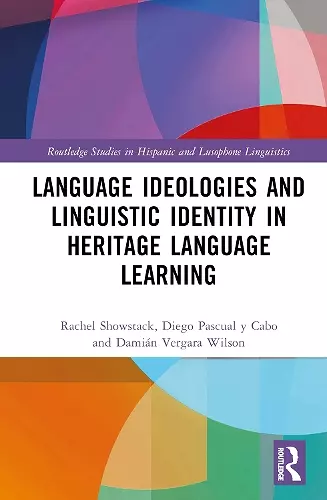Language Ideologies and Linguistic Identity in Heritage Language Learning
Rachel Showstack author Diego Pascual y Cabo author Damián Vergara Wilson author
Format:Hardback
Publisher:Taylor & Francis Inc
Published:16th Apr '24
Currently unavailable, and unfortunately no date known when it will be back

Language Ideologies and Linguistic Identity in Heritage Language Learning addresses the ways in which discourses about language value and identities of linguistic expertise are constructed and negotiated in the Spanish heritage language (HL) classroom, and how the classroom discourse shapes, and is shaped by, the world outside of the classroom.
The volume examines the sociopolitical contexts, personal histories, and communicative practices of Spanish teachers and students in two diverse geographic regions: the US states of Texas and Kansas. Adopting an integrated sociocultural approach, it considers the ways in which individuals draw from multiple linguistic resources and social practices in daily interaction and how they articulate their beliefs about language through storytelling. Rich interactional data, examples from social media, and stories of community engagement are utilized to demonstrate how Spanish heritage speakers use language creatively and proactively to legitimize and claim power in their home and community linguistic practices.
This is an invaluable resource for applied linguists who seek to better understand the relationship between language, ideology, and identity and for graduate students and researchers in the fields of linguistics, Spanish, and HL education.
"At a time when updated ACTFL Guidelines again attempt to define what it means to “know” a world language, this book offers a powerful examination of the social justice challenges surrounding the teaching and learning of Spanish as a heritage language. It should be required reading for all future teachers of Spanish in the United States."
Guadalupe Valdés, Stanford University, USA.
"Drawing upon a rich sociocultural perspective and ethnographic methodology, this book presents a unique lens for analyzing the discourse practices that frame and shape the teaching and learning of Spanish in the U.S. and its speakers' identity formation. It highlights the importance of moving away from “one-model fits all” to embrace a teaching approach that is nuanced and sensible to students’ dynamic and complex individual experiences with Spanish use between the home and school environments. A must-read for educators and administrators aiming to design more equitable and just Spanish learning environments in the U.S."
María Luisa Parra, Harvard University, USA.
ISBN: 9780815364771
Dimensions: unknown
Weight: 453g
158 pages